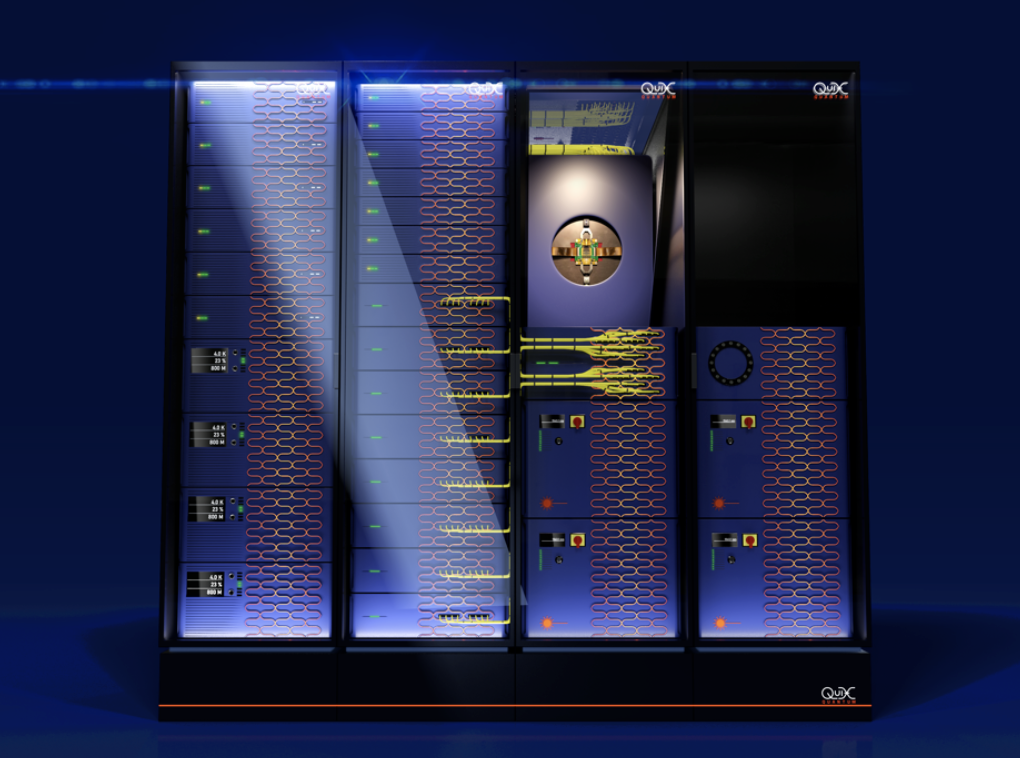Insider Brief
- The German Aerospace Center (DLR) has commissioned a subsidiary of Universal Quantum to build a fully scalable trapped ion quantum computer.
- The quantum computers will be built within 4 years at the DLR facilities in Hamburg and will be made accessible to partners.
- Trapped ion technology is considered a promising approach to building quantum computers.
- Image: Universal Quantum
PRESS RELEASE — The German Aerospace Center (DLR) has commissioned Universal Quantum Deutschland GmbH, a subsidiary of British startup Universal Quantum, with building a fully scalable trapped ion quantum computer. This comes as part of the German Quantum Computing Initiative founded by the German Ministry of Economy, a wider quantum initiative by the German federal government. With an investment of 67 million euros in total, the DLR is bringing two world-first innovations to Hamburg: The first one will be a single-chip quantum computer with a sophisticated electronic quantum computer chip. The second one will be a multi-chip quantum computer that will initially consist of up to 100 qubits. The basis for both machines will be the most powerful chip ever developed for a quantum computer. The quantum computers will be built within 4 years at the DLR facilities in Hamburg and will be made accessible to partners.
Trapped ion technology is one of the most mature approaches to building quantum computers. Experts believe that millions of qubits will be required to solve some of the most complex problems that benefit society. To achieve this, there are a few challenges: the reliable connection of chips – also called modules as well as cooling temperatures and other engineering requirements. Universal Quantum’s unique approach solves both of these issues and more, allowing modules to be connected like a jigsaw puzzle to scale to high qubit numbers, all while requiring only moderate cooling temperatures.
Until now, there has been limited access to working prototypes for researchers. In building these two computers, Universal Quantum and the DLR will be opening the door to the next step in quantum computing – the development of real-world applications on a scalable quantum computer. The two machines will allow researchers to test new concepts for software development and continue to build on existing skills, that are crucial in today’s global quantum race.
Universal Quantum has focused on building scalable quantum computers from day one and Germany now becomes the second government backing this key mission following the UK government. As part of a UK government supported project, Universal Quantum leads a consortium that includes Rolls Royce where the focus is on developing a quantum computer that can help to build more fuel-efficient turbines for aviation, thus reducing fuel consumption and emissions.

“Germany is helping to move the needle on quantum computing becoming useful to society and we’re thrilled that another major government is becoming a supporter and customer of our stellar team and technology, building on our recent successes with the UK government,” said Sebastian Weidt, CEO and Co-Founder of Universal Quantum. “This is a huge validation of how unique and promising our technology is, and represents a major step forward in our mission to build quantum computers that will help enable people to solve the biggest challenges humanity is facing. We are looking forward to expanding our technology into new markets, building on our recent successes with partners that share our values.”
“Our team has worked intensively on the development of our technology. With the DLR contract, we have reached an important milestone and received further recognition of the quality of our technology,” said Prof. Winfried Hensinger, Chief Scientist, Co-Founder and Chairman of Universal Quantum. “Key to our technical concept is the inherent scalability of the quantum computers we are building. Our mission is to solve many fundamental problems of our time – this is the next step along the way.”
The project is part of the German government’s strategic promotion of quantum technology, with the Research and Economics Ministries providing the largest investment ever made by a European government for this purpose. DLR is allocating one-third of this funding to establish a cluster of excellence for quantum computing with innovation centers in Hamburg and Ulm.
“Ion trap systems allow universal arithmetic operations. They are not dedicated to solving specific tasks,” explains Karla Loida, Project Manager for the Quantum Computing Initiative. “Quantum computers based on ion traps have a number of advantages: the qubits are comparatively stable and offer superlative gate properties – a prerequisite for building high-quality quantum computers. Integration on microchips and innovative chip designs mean that scalability is now within reach. The technologies required for construction have now reached maturity. Integration on microchips has also proven successful.”
If you found this article to be informative, you can explore more current quantum news here, exclusives, interviews, and podcasts.




















